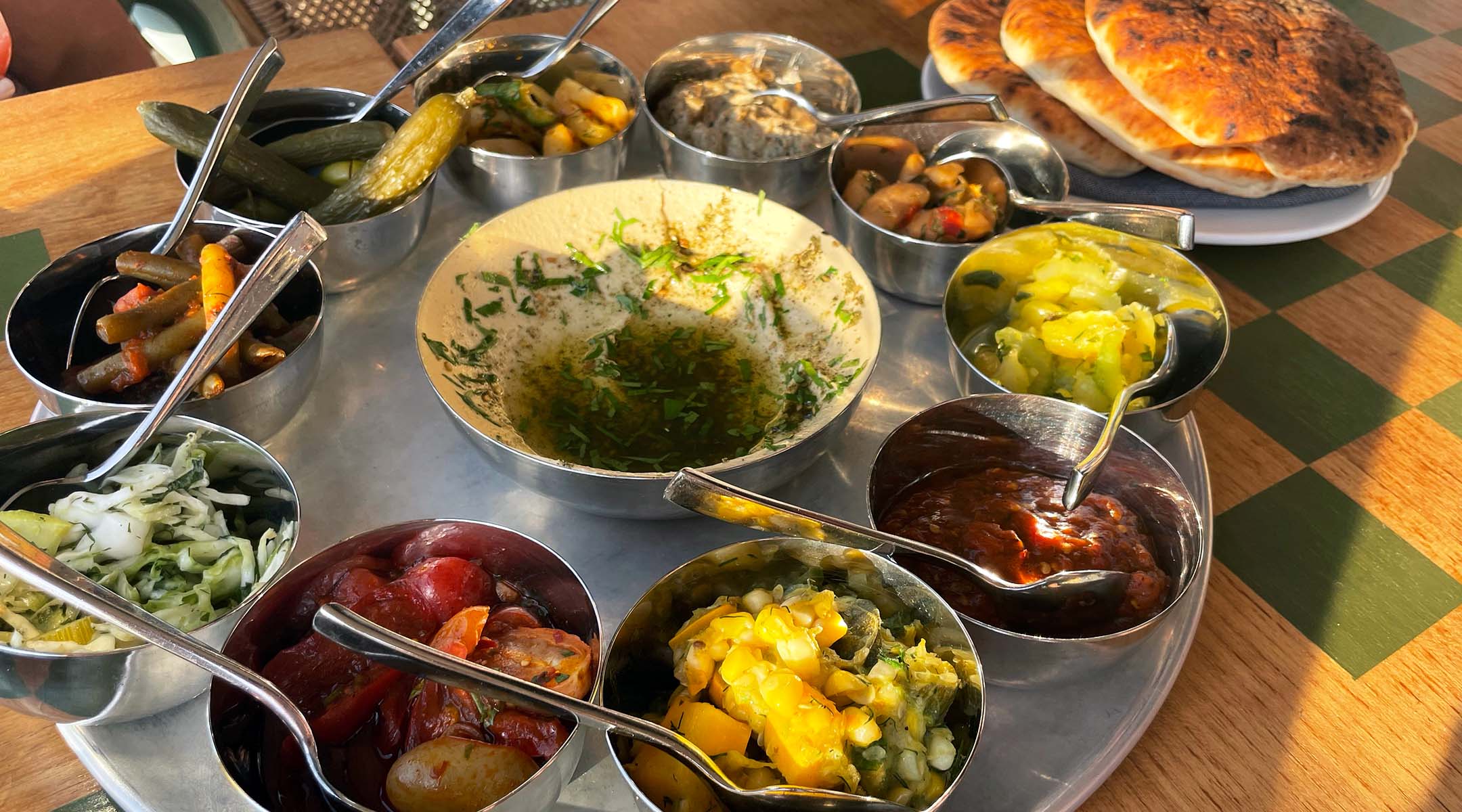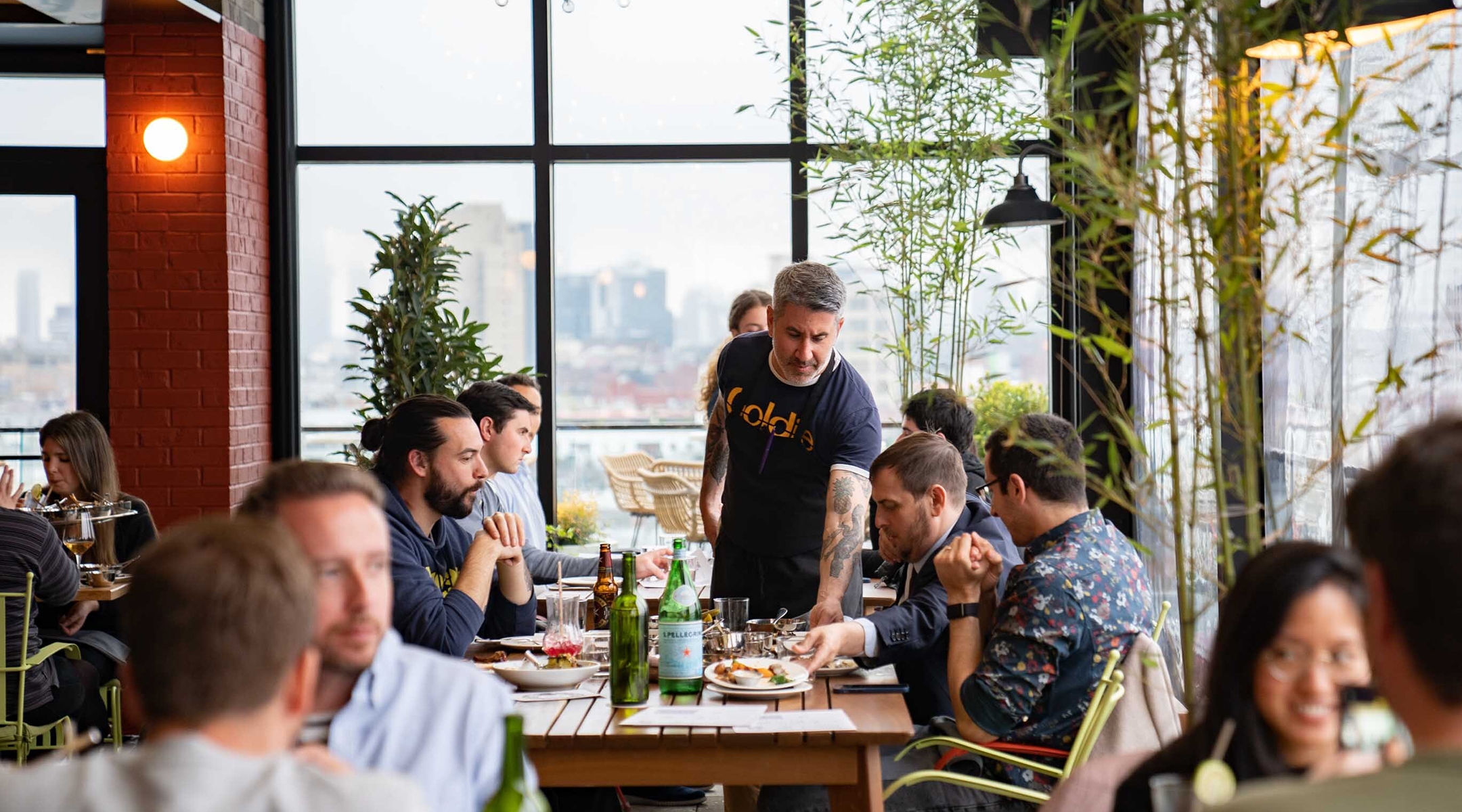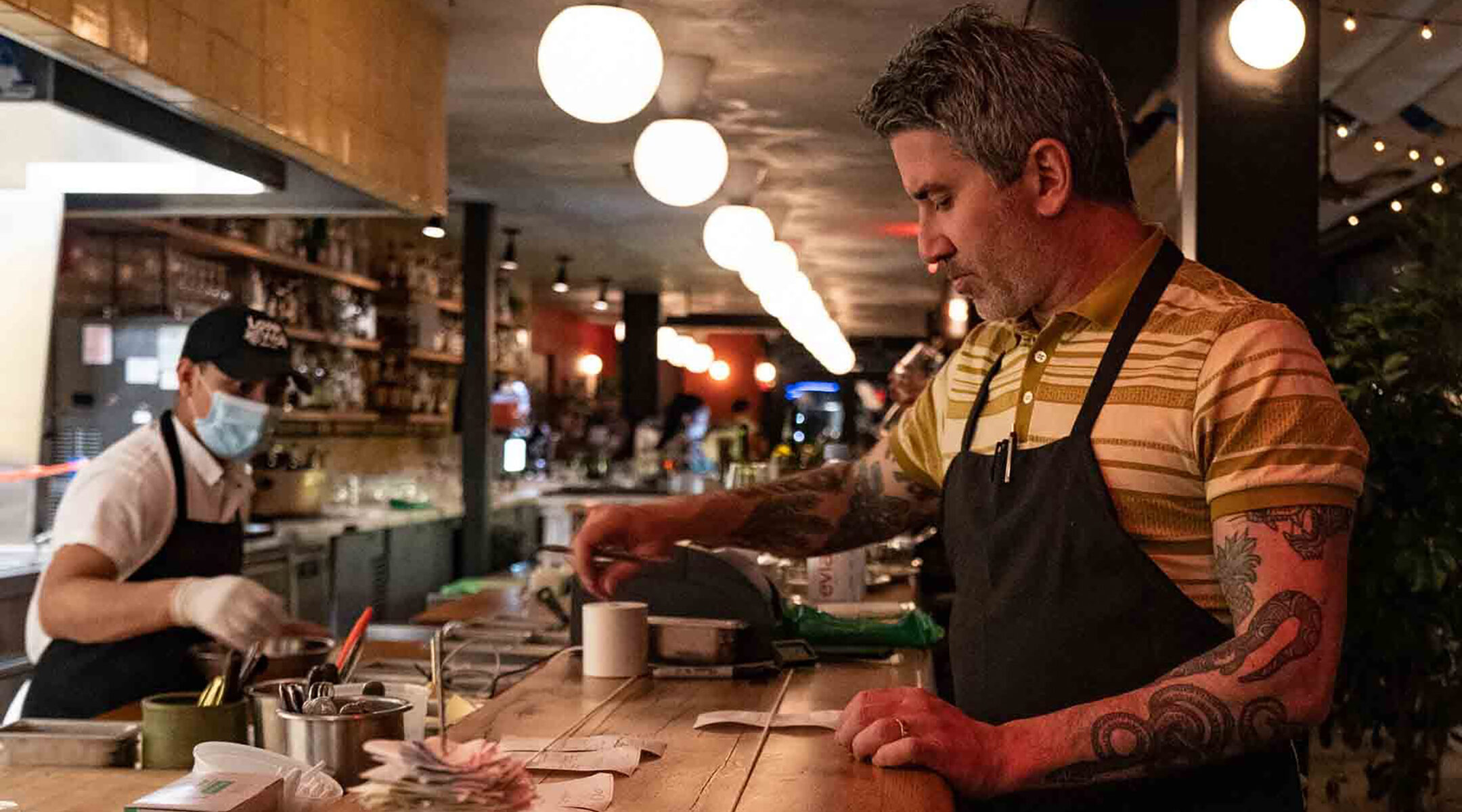(New York Jewish Week) — It’s 95 degrees and a blazingly humid summer evening on the roof of the Hoxton hotel in Williamsburg, Brooklyn, where the open kitchen at the trendy new restaurant Laser Wolf has the air feeling even hotter than steamy Wythe Avenue down below.
According to chef Michael Solomonov, a co-owner of the buzzy establishment, that’s exactly how it’s supposed to be at a shipudiya, or Israeli skewer house, where kebab-style meats are cooked on charcoal grills.
“It’s hot as shit and there’s smoke everywhere,” Solomonov, 44, told the New York Jewish Week, describing a typical shipudiya. “It feels very much like a Tel Aviv restaurant.”
Yes, Laser Wolf — named for Lazar Wolf, the shtetl butcher from the musical “Fiddler on the Roof” — may be located in Brooklyn’s trendiest neighborhood, atop a $100 million hotel development that opened in 2019. But it also might be the most Israeli thing the famed restaurateur has ever done.
“There’s a couple shit-holey awesome little restaurants there like this — with this concept — and that was really the catalyst for opening an Israeli food [establishment like this] in the United States,” Solomonov told our party of three, seated at a table overlooking the East River and the Lower East Side skyline in the hazy distance.

Laser Wolf, located on top of The Hoxton in Williamsburg, has a view of the Manhattan skyline. (Caleb Guedes-Reed)
“Meat on a stick over coals just blows away anything you can make,” he added.
This clearly rings true for restaurant-goers, because after opening in May, Laser Wolf quickly became known as the “restaurant of the summer.” (During the restaurant’s first weeks, reservations were reportedly snatched up within minutes, according to Brooklyn Magazine.) Laser Wolf was included on Condé Nast Traveler’s list of the “best new restaurants in the world,” and the New York Times named it one of the most “exciting” restaurants in the United States.
The rooftop restaurant is far from Solomonov’s first big success in the culinary world. Along with his business partner Steve Cook, he owns a slew of famed restaurants in Philadelphia, including Zahav — which is credited with helping kick off an “Israeli food revolution in the U.S.,” winning the James Beard Award for best restaurant in 2019 — and Abe Fisher, known for its contemporary take on Old World Jewish cooking.
Solomonov and Cook have also written two cookbooks about Israeli cooking: “Zahav: A World of Israeli Cooking,” which won James Beard Book of the Year, and “Israeli Soul: Easy,Essential, Delicious.”
But for Solomonov — who was born in Israel and moved to Pittsburgh when he was 3 years old — Laser Wolf, his first outpost in Brooklyn, represents a return to something more basic, more authentically Israeli.
“We felt like we had to make fine food in order to be a chef of notoriety, but then the only thing we’d want to fucking eat was this Israeli [skewer] experience,” he said. “It’s the utilitarian way to eat.”

Colorful bowls full of salatim surround fresh hummus. (Caleb Guedes-Reed)
Like at a shipudiya in Israel, the meals at Laser Wolf are served family-style and include an array of appetizers as well as dessert. Dishes such as shawarma-spiced cauliflower ($45), brisket kebab ($48) and tuna shishlik ($54) begin with smooth whips of hummus and warm, fresh pita, which are brought to the table by hipster waiters in floral print button ups and bright rimmed sunglasses. The hummus sits at the center of a constellation of shiny silver bowls containing colorful vegetable salatim, or Israeli salads, such as pickled green tomato with cucumber and harissa, Israeli pickles and pineapple with celery.
While the charcoal-grilled skewers are the main attraction, Solomonov said that Laser Wolf also aims to highlight the diversity of Israeli flavors, which draw upon the various lands and cultures that Jews have inhabited over the centuries. He pointed to a salad of eggplant covered in dill and roasted tomatoes and described how the dish, amba-spiced eggplant, is dusted with mango powder. “This is Iraqi,” he explained. Meanwhile, the schug, he said, a deep green hot sauce, originates from Yemen, while matbucha, a tomato and pepper salad, hails from Morocco.
“If you were in Israel 20 years ago and asked an Israeli where the best Israeli restaurant was, they wouldn’t have had an answer, because there’s Iraqi, Palestinian, there’s Ashkenazi, and you have all the corresponding street foods,” he said. “But I feel like the idea of Israeli cuisine is taking all of those things. You have to use all of those different components and synthesize them.”

Solomonov checks in on a table. (Colby Kingston)
In a nod to New York’s very non-Mediterranean climate, the open-air concept at Laser Wolf is designed to weather winters as well. There is heating atop the roof, said a spokesperson, and the space can be sealed from the elements as needed.
For now, however, diners are still soaking up the summer vibes. “People love it,” Solomonov said, raising his voice slightly in order to be heard over the increasing din of our fellow diners, which included groups of men in suits and 30-somethings on dates.
“There’s so much going on,” he added. “It’s loud and you fucking share and shout at your dining partner with your mouth full. It’s a very Israeli experience.”
Join us for an intimate conversation with Shannon Sarna, editor of The Nosher and author of the new cookbook “Modern Jewish Comfort Food,” and award-winning Israeli-American chef Michael Solomonov. They’ll discuss the meaning and pleasures of Jewish comfort food, and how these foods can bring us closer to each other, in a conversation moderated by Philissa Cramer, editor-in-chief of the Jewish Telegraphic Agency. The event happens tonight at this Zoom link at 8:30 p.m. ET.
The New York Jewish Week brings you the stories behind the headlines, keeping you connected to Jewish life in New York. Help sustain the reporting you trust by donating today.





